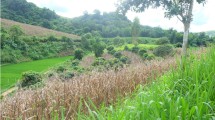Abstract
This study critiques the idea of a “Western science -- indigenous knowledge” dichotomy in agricultural knowledge by examining the hybrid nature of knowledge use and incorporation by villagers in Madhya Pradesh, India. By analyzing knowledge systems as multi-leveled structures consisting of concrete practices linked to more abstract, explanatory concepts, this paper illustrates how information from multiple sources is integrated into local bodies of knowledge about tree management. Practices such as urea fertilization from formal global science might be explained by concepts such as that of a hot/cold duality from informal folk science. Similarly, other pieces of knowledge stemming from diverse knowledge systems are shown to become mixed and matched on practical and conceptual levels. Additionally, several knowledge elements used locally appear to be held in common by many knowledge systems around the world, rendering the determination of their origins in one system or another nearly impossible. These observations lead to the conclusion that local knowledge systems of tree management are better characterized as “open” systems rather than distinct, “closed” systems. Furthermore, the constant exchange of material between formal and informal, local and global systems renders untenable any strict dichotomy of knowledge systems.
Similar content being viewed by others
References
Agrawal, A. (1995). “Dismantling the divide between indigenous and scientific knowledge,” Development and Change 26: 413–439.
Altieri, M. A. (1989). “Rethinking crop genetic resource conservation: A view from the South,” Conservation Biology 3(1): 77–79.
Atran, S. (1990). Cognitive Foundations of Natural History: Towards an Anthropology of Science. New York: Cambridge University Press.
den Biggelaar, C. (1991). “Farming systems development: synthesizing indigenous and scientific knowledge systems,” Agriculture and Human Values Winter–Spring: 25–36.
Bose, T. K. (1985). Fruits of India: Tropical and Subtropical. Calcutta: Naya Prokash.
Brodt, S. B. (1998). Learning from the Land: Local Knowledge Systems of Tree Management in Central India. University of Hawai'i, Mānoa, Honolulu, Hawai'i: Doctoral Dissertation in Geography.
Browder, J. O. (1995). “Redemptive communities: Indigenous knowledge, colonist farming systems, and conservation of tropical forests,” Agriculture and Human Values Winter: 17–30.
Burkill, I. H. (1966). A Dictionary of the Economic Products of the Malay Peninsula. Kuala Lumpur: Ministry of Agriculture and Co-operatives.
Centre for Monitoring Indian Economy (1993). Profiles of Districts November 1993. Bombay: Centre for Monitoring Indian Economy Pvt. Ltd.
Chambers, R. (1983). Rural Development: Putting the Last First. Essex: Longman Scientific and Technical.
Chambers, R., A. Pacey, and L. A. Thrupp (1989). Farmer First: Farmer Innovation and Agricultural Research. London: Intermediate Technology Publications.
Dash, V. B. and A. M. M. Junius (1983). A Hand Book of Ayurveda. New Delhi: Concept Publishing Co.
Devall, B. and G. Sessions (1985). Deep Ecology: Living as if Nature Mattered. Layton, UT: Gibbs M. Smith, Inc.
Ellen, R. and H. Harris (1997). Concepts of Indigenous Environmental Knowledge in Scientific and Development Studies Literature. A Critical Assessment. Canterbury: University of Kent, APFT Working Paper 2.
Gupta, S. (1971). Plant Myths and Traditions in India. Leiden: E. J. Brill.
Hayes, W. B. (1945). Fruit Growing in India. Allahabad, India: Kitabistan.
Heyd, T. (1996). Letter in: “Comments on article by Arun Agrawal,” Indigenous Knowledge and Development Monitor 4(1): 12–19.
Horton, R. (1982). “Tradition and modernity revisited,” in M. Hollis and S. Lukes (eds.), Rationality and Relativism (pp. 201–260). Cambridge, MA: The MIT Press.
Howes, M. and R. Chambers (1980). “Indigenous technical knowledge: Analysis, implications and issues,” in D. W. Brokensha, D. M. Warren, and O. Werner (eds.), Indigenous Knowledge Systems and Development (pp. 329–340). Lanham, MD: University Press of America.
Jolly, J. (1977). Indian Medicine. New Delhi: Munshiram Manoharlal Publishers.
Kalland, A. (1994). “Indigenous knowledge — local knowledge: prospects and limitations,” in B. Hansen (ed.), Arctic Environment. A Report on the Seminar on Integrating Indigenous Peoples' Knowledge, September 20–23 (pp. 150–167). Copenhagen: Ministry of the Environment/The Home Rule of Greenland.
Kurin, R. (1992). “Indigenous agronomics and agricultural development in the Indus Basin,” in M. R. Dove and C. Carpenter (eds.), Sociology of Natural Resources in Pakistan and Adjoining Countries (pp. 31–64). Lahore: Vanguard Books.
Laderman, C. (1981). “Symbolic and empirical reality: A new approach to the analysis of food avoidances,” American Ethnologist 8(3): 468–493.
Pfeifer, K. (1997). “Modernization in disguise?: The problem with a theory of indigenous knowledge,” prepared for the International Conference on Creativity and Innovation at Grassroots, January 11–14. Ahmedabad, India: Indian Institute of Management.
van der Ploeg, J. D. (1989), “Knowledge systems, metaphor and interface: The case of potatoes in the Peruvian highlands,” in N. Long (ed.), Encounters at the Interface: A Perspective on Social Discontinuities in Rural Development (pp. 145–163). Wageningen, The Netherlands: Agricultural University Wageningen.
Richards, P. (1985). Indigenous Agricultural Revolution: Ecology and Food Production in West Africa. London: Hutchinson.
Schoonmaker Freudenberger, K. (1994). “Challenges in the collection and use of information on livelihood strategies and natural resource management,” in I. Scoones and J. Thompson (eds.), Beyond Farmer First: Rural People's Knowledge, Agricultural Research and Extension Practice (pp. 124–133). London: Intermediate Technology Publications.
Scoones, I. and J. Thompson (1994), “Knowledge, power and agriculture — towards a theoretical understanding,” in I. Scoones and J. Thompson (eds.), Beyond Farmer First: Rural People's Knowledge, Agricultural Research and Extension Practice (pp. 16–32). London: Intermediate Technology Publications.
Sengupta, S. (1980), Sacred Trees Across Cultures and Nations. Calcutta: Indian Publications.
Voeks, R. A. (1997), Sacred Leaves of Candomble: African Magic, Medicine, and Religion in Brazil. Austin, TX: University of Texas Press.
Walker, D. H., F. L. Sinclair, and B. Thapa (1995), “Incorporation of indigenous knowledge and perspectives in agroforestry development, part 1: Review of methods and their application,” Agroforestry Systems 30: 235–248.
Author information
Authors and Affiliations
Rights and permissions
About this article
Cite this article
Brodt, S.B. Interactions of formal and informal knowledge systems in village-based tree management in central India. Agriculture and Human Values 16, 355–363 (1999). https://doi.org/10.1023/A:1007537809389
Issue Date:
DOI: https://doi.org/10.1023/A:1007537809389




